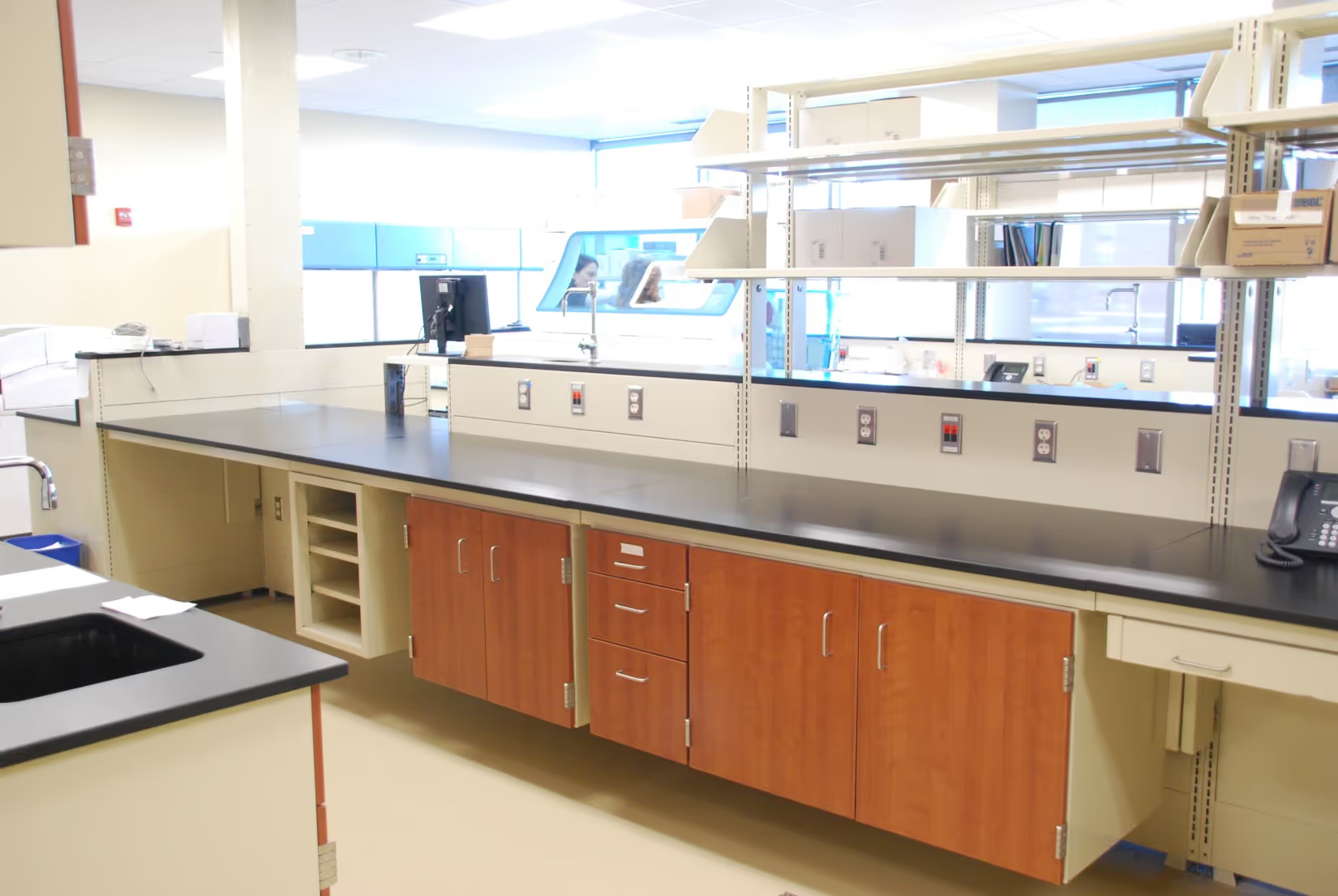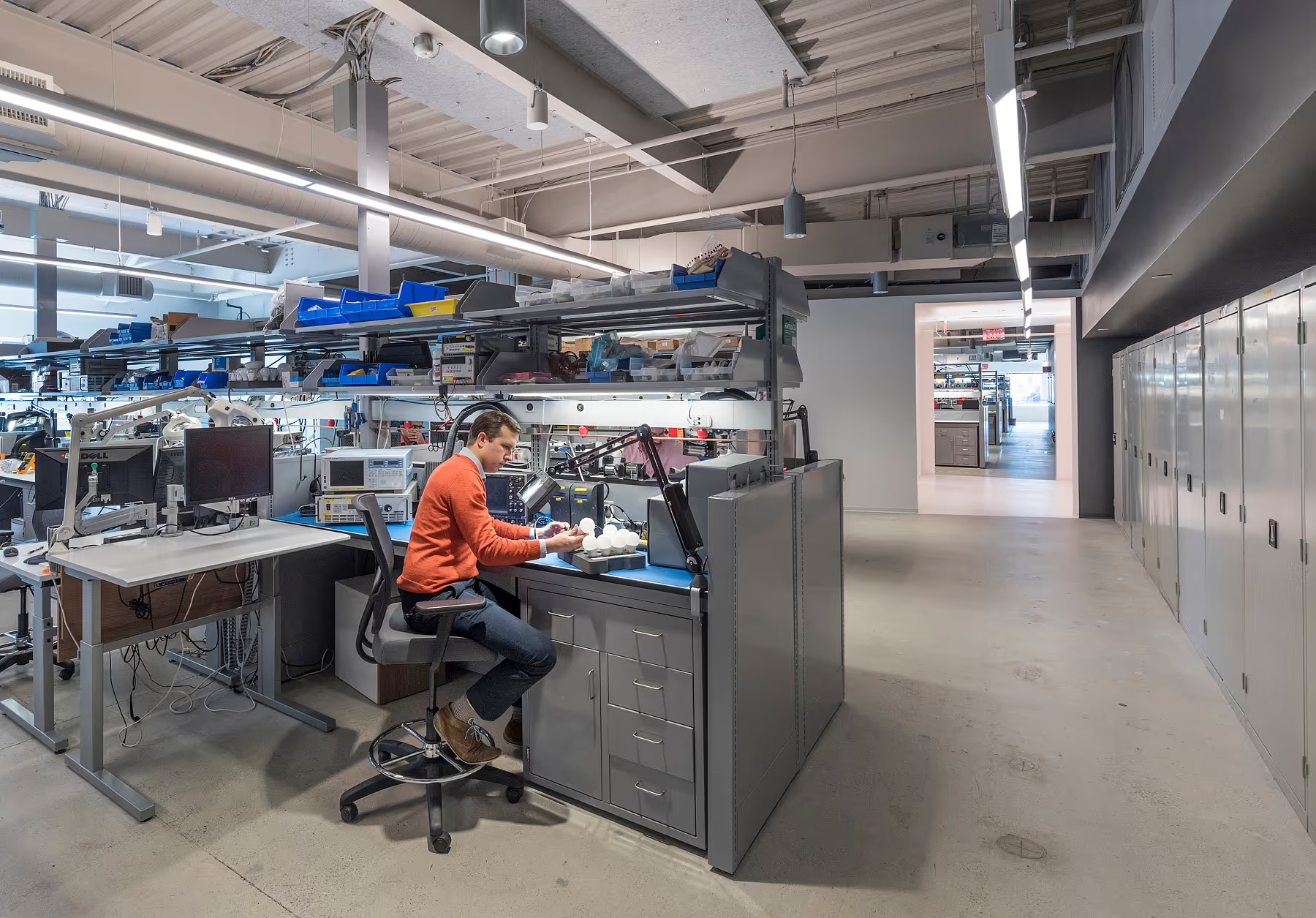What is Laboratory Furniture?
Modular laboratory furniture is reconfigurable lab casework and equipment designed to adapt as research, education, or industrial needs change. Unlike fixed systems, modular setups offer flexibility, ergonomic efficiency, and sustainability by allowing components to be rearranged, reused, or expanded—helping institutions reduce costs, stay compliant, and future-proof their laboratories.
Defining Modular Laboratory Furniture
Modular laboratory furniture is exactly what it sounds like—lab casework and equipment designed to move, adapt, and evolve with your needs. Instead of being bolted to the floor like immovable objects from a 1950s chemistry classroom, modular systems allow labs to reconfigure without calling in a demolition crew.
Traditional fixed casework is basically the “built-in cabinets” of the lab world: they’re not going anywhere once installed. That might work fine for a static setup, but fixed furniture quickly feels like a straitjacket in today’s environment—where research priorities shift faster than trending memes. Modular furniture breaks that rigidity, allowing institutions to reimagine layouts without rebuilding from scratch.
So, why is modularity becoming the new standard? Simple:
- Science moves fast. Research evolves, technology changes, and labs need to keep pace.
- Budgets matter. It’s cheaper to reconfigure furniture than to renovate an entire facility.
- People come first. Adjustable workstations improve ergonomics and support long-term productivity.
- Sustainability sells. Reusable, reconfigurable systems mean less waste and fewer replacements.
Think of modular lab furniture as “LEGO for grown-ups.” You can take it apart, rebuild it, and adapt it to tomorrow’s challenges without starting over.
Curious how modular systems integrate into complete lab environments? Explore ICI Scientific’s flexible lab furniture solutions designed to evolve alongside your institution’s needs.

Core Benefits of Modular Lab Furniture
The real charm of modular laboratory furniture is that it doesn’t lock you into yesterday’s layout. Labs evolve, projects shift, and budgets tighten—modularity ensures your furniture isn’t the bottleneck.
- Flexibility to Reconfigure
- With modular furniture, today’s biology bench can become tomorrow’s chemistry station. Need to add more storage? Roll in a cabinet. Switching from teaching to research? Rearrange the benches. Flexibility keeps downtime minimal and productivity high.
- Cost Efficiency Over Time
- Renovating a lab with fixed casework is like gutting a kitchen—expensive and disruptive. Modular systems let you adapt without ripping everything out. Institutions save big by reusing existing components instead of starting from scratch every time priorities shift. In other words: less construction dust, more budget left for actual science.
- Ergonomic Design for Comfort and Productivity
- Scientists aren’t robots (yet). Modular furniture often includes height-adjustable benches, mobile workstations, and customizable storage, which means less back strain and more focus on the research. Comfortable researchers make fewer mistakes, and fewer mistakes equal stronger results.
- Sustainability Through Reusability
- Let’s be real: tossing out entire casework labs isn’t exactly eco-friendly. Modular systems extend product life cycles by being adaptable and reusable. That means less landfill waste and a greener footprint for institutions under pressure to meet sustainability goals.
A modular lab isn’t just a space—it’s a strategy. By choosing systems that evolve with science, you’re buying more than furniture; you’re buying resilience.
And here’s the kicker: labs that adopt modular solutions often find collaboration improves too. People can rearrange spaces for teamwork, break them down for individual work, and reset for the next project without calling a contractor.

Types of Modular Lab Furniture
Modular lab furniture isn’t one-size-fits-all—it’s a toolbox full of options you can mix and match depending on what your lab needs today (and tomorrow). Let’s break down the main players.
- Mobile Lab Benches and Workstations
- These are the Swiss Army knives of the lab world. Mounted on wheels can be rolled, rearranged, or locked into place depending on the day’s work. Need an open floor plan for a collaborative experiment? Shift them around. Need a tight, orderly row for teaching? Line them up. Flexibility is literally built in.
- Adjustable Shelving and Storage Units
- Research is messy, but your storage doesn’t have to be. Adjustable shelving lets labs scale up or down depending on equipment size and workload. Tall one day, short the next—it’s the IKEA mindset but engineered for science. The best part? Reconfigurable storage grows with your inventory, not against it.
- Interchangeable Casework and Fixtures
- Unlike fixed cabinetry, modular casework can be swapped or reconfigured without a construction crew. Drawers, cabinets, sinks, or specialty fixtures can be rearranged like puzzle pieces. This is especially useful in multipurpose labs where you’re handling chemistry experiments one semester and the next you’re running physics demos.
- Specialized Modular Systems
- Not all labs are created equal, which is where specialty modular systems come in. Education labs need flexible layouts for teaching multiple classes. Research labs require quick adaptability for new projects or grant-driven changes. Industrial labs benefit from robust, heavy-duty modular systems that handle large-scale processes.
The beauty of modular furniture is that it bends, shifts, and evolves with your science instead of boxing it in. It’s not just furniture—it’s infrastructure you can actually move.

Applications Across Different Institutions
One of the biggest wins with modular laboratory furniture is how it adapts across completely different environments. Whether teaching high school biology or running industrial-scale testing, modularity bends to fit the mission.
- Educational Labs
- High schools, colleges, and universities all face the same challenge: multiple classes, one shared lab space. Modular benches and mobile casework let instructors flip the room between chemistry, physics, and biology without calling maintenance every semester. Students get hands-on learning, and institutions avoid the cost of building three separate labs.
- Research Labs
- Research doesn’t sit still—funding shifts, experiments change, and new equipment is always around the corner. Modular systems give labs the agility to pivot fast. Need more bench space for a team project? Rearrange the workstations. Adding sensitive instruments? Adjust shelving or integrate specialized casework. The ability to adapt layouts on the fly keeps projects moving forward instead of waiting for construction crews.
- Industrial Labs
- In industry, scale is everything. Modular lab furniture supports the ebb and flow of production by allowing companies to scale up during high-demand projects or slim down when workloads decrease. Heavy-duty mobile benches, chemical-resistant casework, and flexible storage units keep operations lean without sacrificing durability. Efficiency here isn’t just about science but protecting the bottom line.
Bottom line: modular lab furniture works because it doesn’t lock you into a single purpose. Whether the audience is students, researchers, or industrial teams, the furniture adapts to people, not the other way around.
This flexibility isn’t just convenient—it’s strategic. Institutions investing in modular systems are future-proofing their labs, ensuring they can evolve with science, education, and industry demands.

Modular Laboratory Furniture by ICI Scientific
ICI Scientific doesn’t treat modular lab furniture as an afterthought—it’s at the core of how they help institutions build smarter, safer, and more adaptable labs. Their product lineup and services are designed to meet every requirement: durability, compliance, and future-ready flexibility.
- Material Options
- ICI offers modular furniture in wood, painted steel, and stainless steel, each suited for different environments. Wood provides a cost-effective, classic option. Painted steel balances durability with design flexibility. Stainless steel is the powerhouse, built for heavy chemical use and long-term resilience. Whatever the material, the craftsmanship holds up to years of demanding lab work.
- Custom Designs and Seamless Integration
- No two labs are the same, and ICI knows that. Their modular systems are designed to integrate into complete laboratory setups, from benches and casework to fume hoods and work surfaces. Customization means institutions get what they need—not a cookie-cutter solution that forces workarounds.
- Design and Support Services
- Buying furniture is one thing. Designing a lab that works in practice is another. ICI supports institutions with lab design assistance, 3D renderings, and BIM/AutoCAD files so project managers can visualize and plan before installation. They even provide job-specific samples, making sure expectations match reality.
- Made in the USA
- ICI emphasizes U.S. manufacturing, ensuring high safety and quality standards. Their modular systems are built with long-term adaptability in mind, so clients don’t just get lab furniture—they get infrastructure designed to evolve with their institution’s needs.
At ICI Scientific, modular isn’t a buzzword. It’s a promise: adaptable lab furniture that grows with science, protects budgets, and supports innovation for the long haul.
Related Searches
Types of laboratory furniture
Best materials for lab furniture
Importance of laboratory casework
Modular laboratory furniture benefits
How to design a laboratory layout


